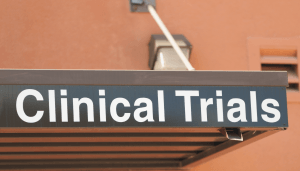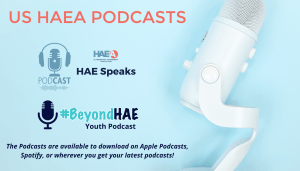From Ianice Viel, HAE Advocate & Digital & Social Media Manager, US HAEA
Guide for Women with HAE: We have exciting news for women and young girls with HAE! Women and girls have extra concerns to acknowledge understanding their HAE diagnosis. While keeping this in mind, the US HAEA has developed a comprehensive guide for women and young girls with HAE to answer questions they might have about how puberty, pregnancy and family planning, or menopause may affect their bodies with HAE.
The US HAEA has also developed a three-part webinar series alongside expert HAE physicians who answer frequently asked questions about how women and young girls experience HAE through different life stages and provide tips on the management of the condition. These events are a great resource for women and young girls of all ages who are interested in learning more about how HAE impacts their lives. The webinars will be recorded and available on the HAE Café after each events’ premiere.
“This resource has allowed me to become more comfortable with how my HAE will affect me in the future. It not only answers questions that I have, but
also provides stories from other women who have gone through similar situations.” – Hannah (Person with HAE)
The Guide is available in English and Spanish. >> Read more about the Guide for Women with HAE and the webinars at haea.org.
 Advances in HAE Research: The US HAEA continues its robust research program and is embarking on timely and relevant projects that will focus on the unique needs of the HAE community. Our ongoing projects include:
Advances in HAE Research: The US HAEA continues its robust research program and is embarking on timely and relevant projects that will focus on the unique needs of the HAE community. Our ongoing projects include:
An HAE-Specific Instrument to Measure Quality of Life. The US HAEA is working on a unique, ground-breaking research study that seeks to accurately show how HAE affects overall quality of life (QoL). The aim of the study is to develop and validate a broad-based HAE QoL instrument that more accurately depicts disease burden. This research will help us publish a QoL questionnaire that (1) truly captures the way HAE affects the everyday life of individuals and families, and (2) demonstrates to health insurers – and others – the value of life-changing improvements in health and QoL that result from modern HAE medicines. Based on concepts derived from behavioral economics, this tool will be more sensitive than any that are currently being utilized. We believe that this cutting-edge project could revolutionize QoL measurement of HAE and other chronic conditions.
Shared Decision-Making Tool. We are currently developing a Shared Decision-Making tool that will enable physicians and people with HAE to work together when making healthcare decisions. This tool works to ensure that both the physician and the person with HAE have a voice in their treatment plan.
HAE and Aging Study. The US HAEA study on HAE and Aging will help us better understand the demographic and clinical characteristics, HAE treatment patterns, HAE impact and burden, and perceived health-related quality of life of the aging HAE population. This study is being designed with a comparator population of people without HAE, and we plan to have these results published in a manuscript when complete in the Fall of 2022. This research project is uniquely important to the HAEA community, as current data on HAE and Aging does not exist.
HAEA Study on the Number of People with HAE in the United States. The US HAEA is dedicated to offering its unique programs, services, and activities to everyone in the United States that has HAE. We believe that past estimates underestimate the true prevalence of HAE. Estimates regarding the number of people with the condition in the United States have an extremely large range, which means we have no idea if we are reaching the entire population. We have initiated a study using sophisticated data mining techniques and expert HAE physician input to calculate the number of people with HAE in the United States. This survey involves a three-step process, first by completing a first initial survey in June, and completing two shorter follow-up surveys in July and September. The results of this study will help the US HAEA to target its outreach efforts to continue building the HAEA community.
 Clinical Trials: Over the past two decades, the US HAEA has played a central role in supporting new drug development by recruiting patients for clinical trials by leveraging our unique reach into the HAE community. We handle all patient contact and referrals to clinical trial sites while never disclosing any personally identifiable patient information to the sponsor, and participate in regular update calls with the sponsor, sharing new information and recruitment status updates.
Clinical Trials: Over the past two decades, the US HAEA has played a central role in supporting new drug development by recruiting patients for clinical trials by leveraging our unique reach into the HAE community. We handle all patient contact and referrals to clinical trial sites while never disclosing any personally identifiable patient information to the sponsor, and participate in regular update calls with the sponsor, sharing new information and recruitment status updates.
The US HAEA assists in clinical trial recruitment for individuals with HAE Type I, Type II, or HAE with Normal C1-Inhibitor and is currently assisting with recruitment efforts for an unprecedented eight HAE clinical trials. Clinical trial participation is crucial in medication development, as well as a critical part of expanding our knowledge of this rare disease.
“I joined a clinical trial in an effort to assure my daughter would not have the same experience I had growing up with HAE.” – Clinical Trial Participant
The HAEA has a proven and successful track record in clinical trial recruitment and continues to recruit for open trials whenever possible.
>> View a list of active clinical trials at haea.org.
 HAEA Round Table: Because HAE is so rare, it can feel isolating to deal with the everyday challenges of learning how to manage living with this rare chronic illness. However, when we come together as a community to talk about our struggles, it is easier to see that we are not alone in our efforts to live a normal life with HAE.
HAEA Round Table: Because HAE is so rare, it can feel isolating to deal with the everyday challenges of learning how to manage living with this rare chronic illness. However, when we come together as a community to talk about our struggles, it is easier to see that we are not alone in our efforts to live a normal life with HAE.
We also realize that at different life stages, HAE can affect individuals in various ways. That is why we have developed the HAE Round Table as a platform for members of our community to connect with their peers about the issues that currently affect them.
Through the HAEA Round Table we will discuss questions that affect each age group, such as:
- How do you explain your HAE diagnosis with others?
- How do you overcome a fear of needles?
- How did you go about obtaining insurance with your HAE diagnosis?
The HAEA Round Table will premiere every other month on the US HAEA official Facebook page Live. You can watch the next Round Table premiere for Young Adults with HAE on 9 August 2022 at 6:30 PM ET. >> Access previous Round Table recordings.
 US HAEA Podcasts: The US HAEA is continuing to present community stories on both of our podcast platforms. These podcasts include:
US HAEA Podcasts: The US HAEA is continuing to present community stories on both of our podcast platforms. These podcasts include:
HAE Speaks Podcast features adults with HAE or their caregivers who speak about various topics that affect the everyday lives of our community members. These topics include learning to come to terms with your diagnosis, mastering travel with HAE, how HAE can affect pregnancy, and gaining a sense of purpose through advocating for HAE. There are currently twenty-six informative episodes of the HAE Speaks podcast.
#BeyondHAE Podcast presents stories from the youngest members of our community. Young people with HAE can face a series of unique challenges when it comes to their diagnosis, so the HAEA has created the #BeyondHAE podcast to unite the youth community through shared experiences. Featured topics include understanding anxiety and how it relates to HAE, facing fear of needles, speaking to significant others or classmates about HAE, and creating a strong support system. There are now thirty-nine illuminating episodes of the #BeyondHAE podcast.
These podcasts are available on Spotify and Apple Podcasts!
ACARE: The second ACARE center has been accredited in the United States. The new center is the Division of Rheumatology, Allergy and Immunology at the University of Cincinnati College of Medicine, Cincinnati (Ohio), headed by Prof. Jonathan Bernstein. You will find contact information on the country page for USA.










